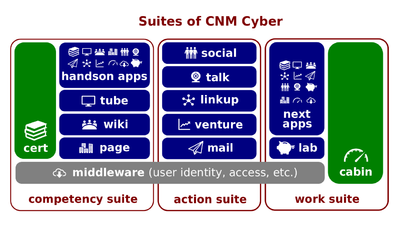Stages of Project Work
Stages of Project Work (hereinafter, the Lectio) is the lesson part of Project Work Essentials lesson that introduces its participants to project management concepts. This lesson belongs to the CNMCT Entrance section of CNMCyber Bootcamps.
Content
The predecessor lectio is Surroundings of Projects.
Script
- Any development of a unique work product can be defined as a project. An adjective, unique, means one-of-a-kind and indicates something that this developer has never created before. Landing a new job, modification of a business, and re-designing a website could serve as examples of projects.
- Developments of those work products that this developer has already created are called operations. Production of thousands of smartphones of the same model is an operation. Launching a new model of a smartphone is a project.
- In real life, each of us has worked on various projects even without realizing that. Have you ever bought something that lasts for long time? Let say, a bicycle? That was a project. Have you ever sold your old bike? Unless you work as a seller in a used bike store, that was a project as well.
- In the corporate world, projects usually involve several people; some of them last many years.
- Whatever project is, project work can be divided in 4 project stages. One stage can be defined as a period in project work that ceases when certain conditions are met, can be reopen, and ends when the project is closed.
- The project initiating ceases when the need of the project is both realized and expressed, the source for the project budget is identified, leaders of project parties are personalized and they established contact.
- The project planning ceases when project baselines are approved.
- The project executing ceases when the project customer or customer's representative accepts the work product.
- Finally, the project closing ends when all the deliverables are delivered and all the payments are made. This stage is the only one that never ceases. If anything is needed after it is closed, a new project should be initiated.
- In Agile projects, project stages always overlap. The pre-development-work planning, which is called Sprint Zero, lays out the rules and priorities for the project. Every day, the planning re-opens to take into consideration those increments and their data that were developed during the previous day.
- Furthermore, project stages may overlap not only in Agile projects. For instance, if the project manager quits before the project closure, the initiating phase should be re-open even after the executing phase is complete and a new project manager should be appointed.
- Among all stages, the executing is pretty much always the costliest. At this stage, workers are hired and supplies are purchased. If any other stage can be started as early as possible, the customer's approval is needed to start the executing stage.
- Surprisingly enough, four stages of work can be identified at operations as well. However, if the execution and closing stages can be similar, the initiating stages are not. Usually, operational businesses plan for one year of operations. Some time before one planned period ends, the managers initiate planning for the next period. If a business is operational, financial sources are established, leaders are personalized and already work together.
- The planning stages of operational businesses usually involve collecting requests for modifications and incorporating them into a new year budget. Operational planning rarely involve designing new solutions.
Key terms
- Project stage, project initiating, project planning, Sprint Zero, project executing, project closing, operations
Closing
- Which of the statements below is incorrect:
- Project closing ceases when all the deliverables are delivered and all the payments are made.
- Approving project baseline is a stage in project planning.
- Project executing ceases when project customer accepts the project work.
- Production of hundred new smartphones of an existing model is an operation.
- None of the other statements is incorrect
The successor lectio is Agile vs Waterfall Work.
